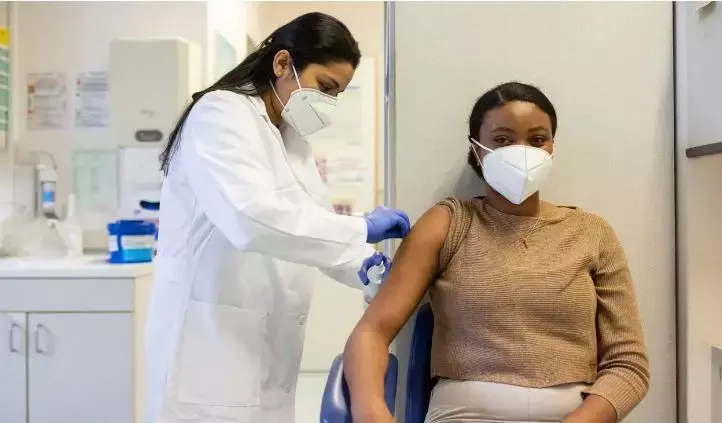- Home
- Medical news & Guidelines
- Anesthesiology
- Cardiology and CTVS
- Critical Care
- Dentistry
- Dermatology
- Diabetes and Endocrinology
- ENT
- Gastroenterology
- Medicine
- Nephrology
- Neurology
- Obstretics-Gynaecology
- Oncology
- Ophthalmology
- Orthopaedics
- Pediatrics-Neonatology
- Psychiatry
- Pulmonology
- Radiology
- Surgery
- Urology
- Laboratory Medicine
- Diet
- Nursing
- Paramedical
- Physiotherapy
- Health news
- Fact Check
- Bone Health Fact Check
- Brain Health Fact Check
- Cancer Related Fact Check
- Child Care Fact Check
- Dental and oral health fact check
- Diabetes and metabolic health fact check
- Diet and Nutrition Fact Check
- Eye and ENT Care Fact Check
- Fitness fact check
- Gut health fact check
- Heart health fact check
- Kidney health fact check
- Medical education fact check
- Men's health fact check
- Respiratory fact check
- Skin and hair care fact check
- Vaccine and Immunization fact check
- Women's health fact check
- AYUSH
- State News
- Andaman and Nicobar Islands
- Andhra Pradesh
- Arunachal Pradesh
- Assam
- Bihar
- Chandigarh
- Chattisgarh
- Dadra and Nagar Haveli
- Daman and Diu
- Delhi
- Goa
- Gujarat
- Haryana
- Himachal Pradesh
- Jammu & Kashmir
- Jharkhand
- Karnataka
- Kerala
- Ladakh
- Lakshadweep
- Madhya Pradesh
- Maharashtra
- Manipur
- Meghalaya
- Mizoram
- Nagaland
- Odisha
- Puducherry
- Punjab
- Rajasthan
- Sikkim
- Tamil Nadu
- Telangana
- Tripura
- Uttar Pradesh
- Uttrakhand
- West Bengal
- Medical Education
- Industry
Pfizer vaccine may reduce risk of COVID-19 infection in pregnant women: JAMA

Pfizer-BioNTech mRNA vaccination compared with no vaccination was associated with a significantly lower risk of SARS-CoV-2 infection in pregnant women, finds a new retrospective cohort study.
The interesting findings have been published in JAMA.
Data on BNT162b2 messenger RNA (mRNA) vaccine (Pfizer-BioNTech) effectiveness and safety in pregnancy are currently lacking because pregnant women were excluded from the phase 3 trial. On December 19, 2020, Israel launched its BNT162b2 vaccination campaign. Although pregnant women were not excluded from receiving the vaccine, they were initially advised to discuss the possibility of vaccination with their treating physician. A month into the campaign, the Israel Ministry of Health released updated recommendations encouraging pregnant women to receive the vaccine.
With such controversial background, researchers aimed to assess the association between receipt of BNT162b2 mRNA vaccine and risk of SARS-CoV-2 infection among pregnant women.
The study was designed as a retrospective cohort study within the pregnancy registry of a large state-mandated health care organization in Israel. Pregnant women vaccinated with a first dose from December 19, 2020, through February 28, 2021, were 1:1 matched to unvaccinated women by age, gestational age, residential area, population subgroup, parity, and influenza immunization status. Follow-up ended on April 11, 2021. Exposure was defined by receipt of the BNT162b2 mRNA vaccine. To maintain comparability, nonexposed women who were subsequently vaccinated were censored 10 days after their exposure, along with their matched pair. The primary outcome was polymerase chain reaction–validated SARS-CoV-2 infection at 28 days or more after the first vaccine dose.
Results revealed some new facts.
- The cohort included 7530 vaccinated and 7530 matched unvaccinated women, 46% and 33% in the second and third trimester, respectively, with a mean age of 31.1 years (SD, 4.9 years).
- The median follow-up for the primary outcome was 37 days (interquartile range, 21-54 days; range, 0-70).
- There were 118 SARS-CoV-2 infections in the vaccinated group and 202 in the unvaccinated group.
- Among infected women, 88 of 105 (83.8%) were symptomatic in the vaccinated group vs 149 of 179 (83.2%) in the unvaccinated group (P ≥ .99). During 28 to 70 days of follow-up, there were 10 infections in the vaccinated group and 46 in the unvaccinated group.
- The hazards of infection were 0.33% vs 1.64% in the vaccinated and unvaccinated groups, respectively, representing an absolute difference of 1.31% (95% CI, 0.89%-1.74%), with an adjusted hazard ratio of 0.22 (95% CI, 0.11-0.43).
- Vaccine-related adverse events were reported by 68 patients; none was severe. The most commonly reported symptoms were headache (n = 10, 0.1%), general weakness (n = 8, 0.1%), nonspecified pain (n = 6, <0.1%), and stomachache (n = 5, <0.1%).
"Increased herd immunity protects both vaccinated and nonvaccinated pregnant women and could attenuate the observed treatment effect over time, as previously reported with cholera vaccines."the team opined.
For full article follow the link: doi:10.1001/jama.2021.11035
Source: JAMA
Dr Satabdi Saha (BDS, MDS) is a practicing pediatric dentist with a keen interest in new medical researches and updates. She has completed her BDS from North Bengal Dental College ,Darjeeling. Then she went on to secure an ALL INDIA NEET PG rank and completed her MDS from the first dental college in the country – Dr R. Ahmed Dental College and Hospital. She is currently attached to The Marwari Relief Society Hospital as a consultant along with private practice of 2 years. She has published scientific papers in national and international journals. Her strong passion of sharing knowledge with the medical fraternity has motivated her to be a part of Medical Dialogues.
Dr Kamal Kant Kohli-MBBS, DTCD- a chest specialist with more than 30 years of practice and a flair for writing clinical articles, Dr Kamal Kant Kohli joined Medical Dialogues as a Chief Editor of Medical News. Besides writing articles, as an editor, he proofreads and verifies all the medical content published on Medical Dialogues including those coming from journals, studies,medical conferences,guidelines etc. Email: drkohli@medicaldialogues.in. Contact no. 011-43720751


